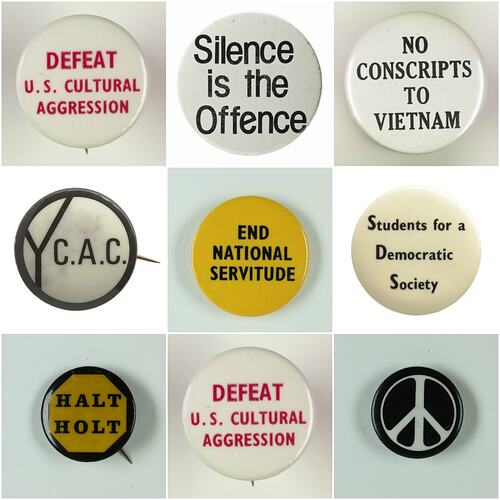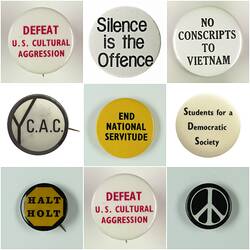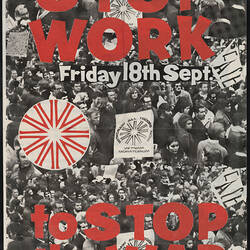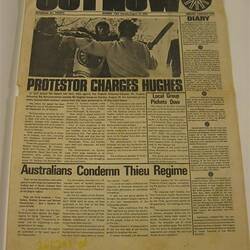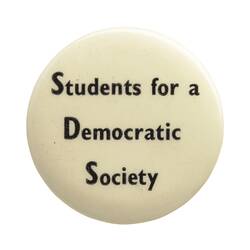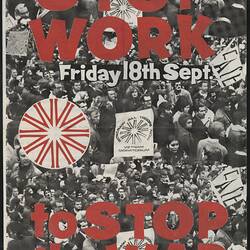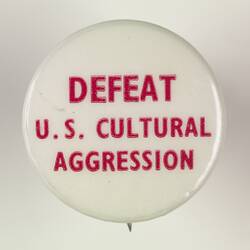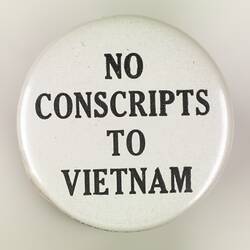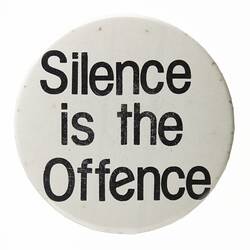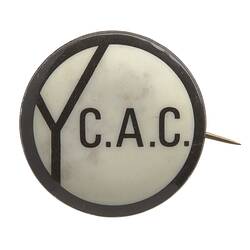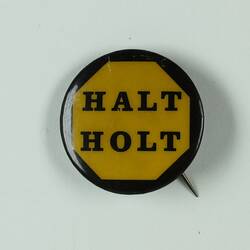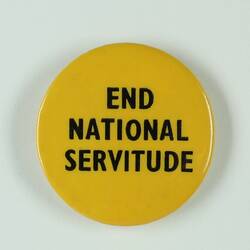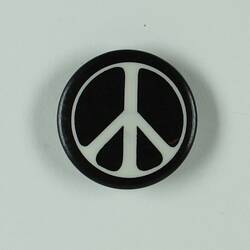Vietnam: Beyond Pity
Vietnam: Beyond Pity is the title of an essay that Michael Hamel-Green wrote in 1970 for the Australian Left Review. It presents his experience of conscription resistance as well as his own take on the state of contemporary society. The essay begins by tracing the moment when he first became interested in contemporary politics. He confesses that upon seeing pictures of the Buddhist Monks that had set themselves in fire in 1963 he experienced horror but in a dissociated way, whereas after conscription had been made mandatory in Australia in 1964, the experience of war became a personal issue for him (Hamel-Green, 1970). The essay also highlights the change that the protest movement was undergoing in the late 1960s, when students felt that 'dissent through the normal channels and in the normal arenas had become programmed into the system' (Hamel-Green, 1970). Therefore they started turning to more radical actions such as blockades and sit-ins, crafting a participatory democracy. It seems that some student protesters at the time were aware that these actions could not result in a complete overhaul of the system, and they instead proposed to 'provide models of resistance and alternative action for those exploited or excluded groups' (Hamel-Green, 1970).
Wreck the Draft!
Anti-war movements occurred in a variety of forms that were often fundamentally different despite their initial similarities. For example, being a draft resistor and a conscientious objector were different responses to the same situation. Alexis Vassiley points out that 'conscientious objection complied with the law, conceding the government's "right to pass immoral legislation. Draft resistance on the other hand was a mass activity, not an individual one, and was a tool to try to end the war. The aim of the resisters was to render the system unworkable' (Vassiley, 2002). Hamel-Green, a prominent figure in the Melbourne resistance movement, recalls the strategy employed by draft resisters was to go underground in safe houses and sanctuaries created inside of student unions and churches, only to emerge during protests. (Hamel-Green, n.d.) The unofficial response of the authorities to student resisters was one of selective prosecution, as making no arrests would undermine the law, while arresting every draft resister would be an unrealistic effort. Apparently 'only a small number of draft resisters were sentenced to the two years jail provided for in the act' [National Service Act, 1964] (Vasilley, 2002).
Resistance Structures
With the National Service Act introduced in 1964, there were already anti-war organisations being formed that same year, such as Youth Campaign Against Conscription and Save Our Sons. However, groups such as YCAC were quite short-lived and not considered radical enough in the views of many students. In 1968, activists at The University of Melbourne established Students for a Democratic Society, based on the American group of the same name. Michael Hamel-Green was among the founders of this structure and he recalls: 'I read and talked and lived politics for the first time in my life' (Hamel-Green, 1970). That same year he took part in organising the first national anti-conscription demonstration in the form of a sit-in outside the Prime Minister's Lodge. Determined to prove a point, the protestors were committed to being arrested rather than conceding and paying a fine. Some protesters did get arrested on this occasion, but the public accused them of fake modesty and trying to make martyrs of themselves (Hamel-Green, 1970). Students for a Democratic Society was instrumental in putting together various resistance campaigns such as "Don't Register" and "Fill in a Falsie", an initiative aimed at filling out false conscription forms in order to disrupt the system. The Australian Underground Draft resister Network was formed in 1970, and it was a movement that helped Hamel-Green, among others, by providing safe shelter. This activist's name also appears in a humorous anthology of protest, 'How to make trouble and influence people: Pranks, hoaxes, graffiti and political mischief-making from across Australia.' This book notes how in 1971, Hamel-Green appeared at a Year 12 Examination at the Royal Exhibition Centre in Melbourne, urging students to resist conscription before disappearing without a trace.
The Collection
At a Trade Union Fair in 1992, the museum acquired eight badges from Michael Hamel-Green. The slogan on three of them is specifically related to conscription: YCAC, No Conscripts to Vietnam and End national Servitude. There is also one badge reading Students for a Democratic Society, reflecting his involvement in setting up this organisation. The other four are targeted at the Vietnam War more generally. Alongside these badges, he also donated a range of political leaflets, broadsheets and magazines from the early 1970s. The groups issuing the written material include the Trade Union Anti-conscription Committee, Federal Pacifist Council of Australia, Radical Action Movement in Melbourne and the Vietnam Moratorium Campaign.
Reference list
Hamel-Green, M. (1970) Vietnam: Beyond Pity, Australian Left Review, 1(24), p.53-65. Available at: http://ro.uow.edu.au/alr/vol1/iss24/10 [Accessed 06.12.2016]
Hamel-Green, M. (n.d.) Opposition to the Vietnam War in Australia. Available at: http://livingpeacemuseum.org.au/ALPM/exhibits/show/vietnam-war-aus [Accessed 06.12.2016]
McIntyre, I. (2009) How to make trouble and influence people: pranks, hoaxes, graffiti & political mischief-making from across Australia. Carlton, Vic: Breakdown Press
Vassiley, A. Smash the Draft!' and other tales: a snapshot of student activism at The University of Western Australia, 1969-1971. The New Critic, [online] Issue 13. Available at: http://www.ias.uwa.edu.au/new-critic/thirteen/vassiley [Accessed 02 Dec.2016]
More Information
-
Keywords
Political Protests, Activism, Vietnam War, 1959-1975, Draft Resistance, Conscription, Anti-Conscription Campaigns, Wars & Conflicts
-
Authors
-
Article types
